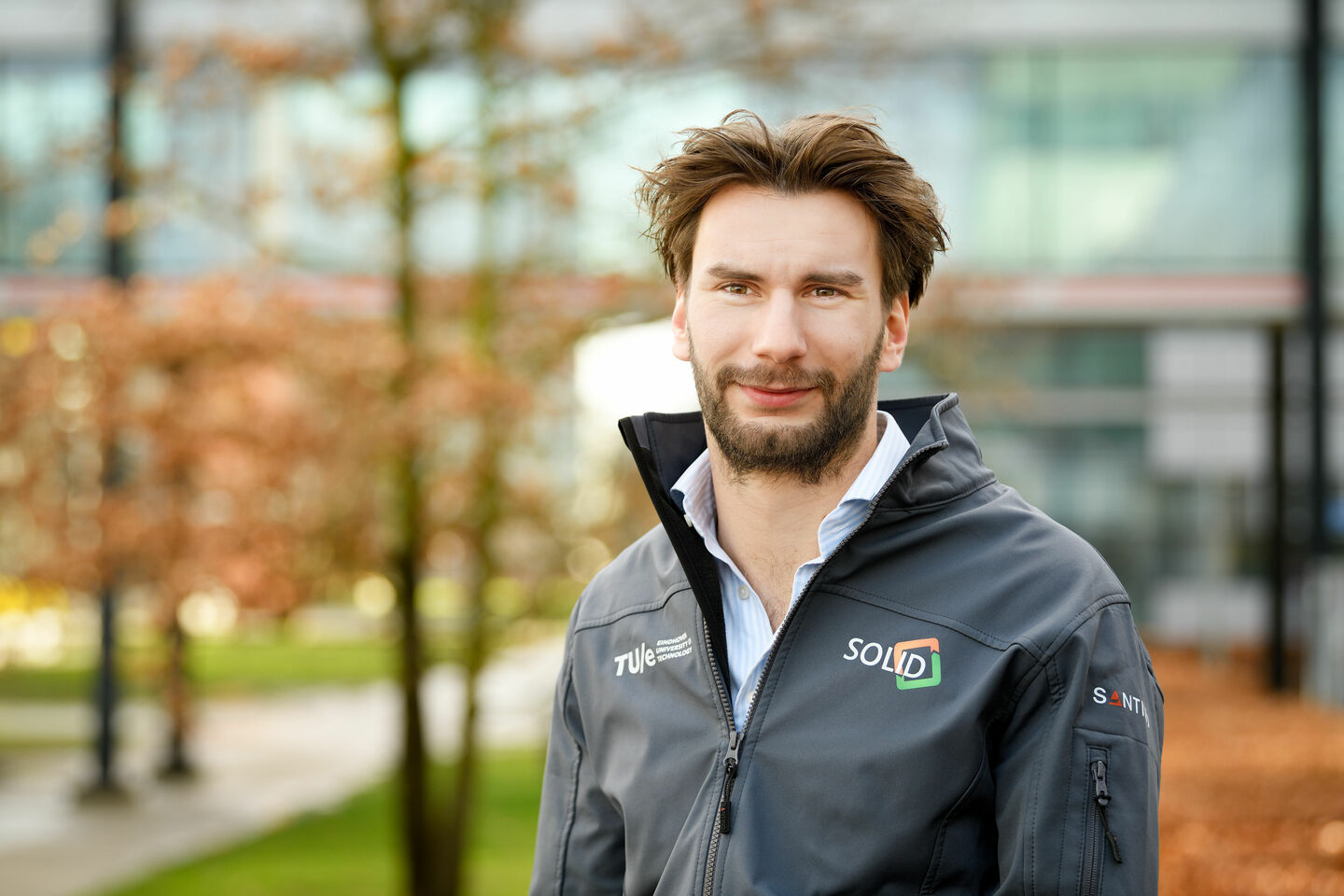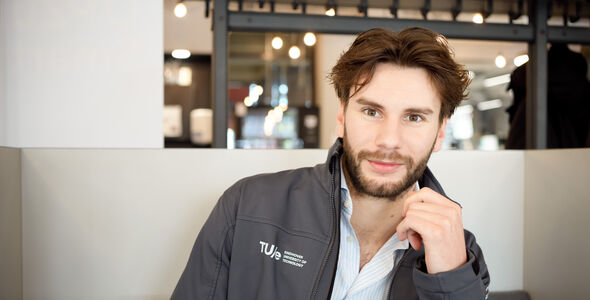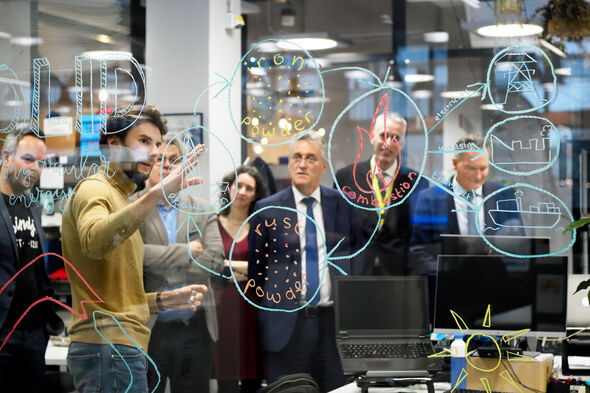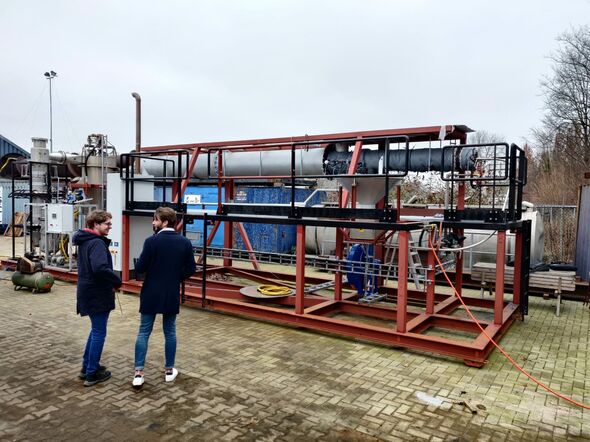
Mark aims for win-win situations
It was only when the end of his student days approached that Innovation Management student Mark Verhagen first thought about joining a student team. He hasn’t regretted it for a day, because as team manager he can fix things and make sure that team SOLID seizes opportunities. “Our metal fuels test installation can be compared to the first steam train.”
Recognizing opportunities, analyzing them and subsequently seizing them together with others. That is what excites Mark Verhagen. Six months before completing the Innovation Management program, he asked himself what his next step would be. He had received several job offers already, but he felt that something was missing. And then his mother-in-law asked him: "What did you like to do most when you were a child?".
Mark's thoughts returned to Dorst (North Brabant) where, in elementary school, he had started a small company that cleans up front yards. "On my way back from school I saw untidy front yards, and I started to wonder why that was the case. People probably don’t have the time for it, or they aren’t interested. And how do we solve the problem?" It ended with a team of friends who decorated a carnival truck with the money they had earned. "That was a lot of fun," Mark remembers. Conclusion: he liked to solve problems even as a child.
Turning point
At the same time when Mark was looking for the motivation for his future, housemate Lex Scheepers told him about the student team he wanted to join: SOLID. It aims to develop a circular and CO2-free fuel: iron powder. "Until that point, I didn’t really have any belief in the energy transition, to be honest," Mark says, "and I didn’t think there was a fitting CO2-free fuel that could make heavy industries sustainable. But after I read about iron powder as a new fuel, I thought to myself: Perhaps it could work!"
When Mark sat down with Lex a few days later, it turned out the idea hadn’t left his head. "I presented suggestions about which companies SOLID should approach, and had some insights into business economics. Lex thought I should tell the team."
Not too late
Mark actually thought he couldn’t be part of a student team because he had already advanced too far with his studies. Because most students join a team during their Bachelor’s degree studies, or before their Master’s. "Nevertheless, I decided to go for a talk." During that conversation, it became apparent that it was in fact an opportunity. "An opportunity to bring into practice what you’ve learned, in collaboration with a highly motivated group, in order to solve a problem."
The team was looking for a new team manager - and then there was Mark. When you ask him what he does for SOLID, he answers: ‘fix things.’ "I spend each day making sure that opportunities are recognized and acted upon. That is why I continuously ask myself: How do I turn this into a win-win situation?" And so, when the mayor stops by, or a delegation from the business sector, he approaches them in the same way he approached the owners of those front yards in Dorst; what can I, or SOLID, do to help you along? "When it turns out we can help each other, we immediately take action."
The great thing about a student team, Mark believes, is that you have the freedom to answer the win-win question, and that you can directly implement the plans. "Since a student team isn’t thought of as potential competition, everyone you talk to has a very open attitude and is willing to help you. This opens doors that otherwise would remain closed."
It makes him more enthusiastic than a job at a large company. "In a large group, there’s the pitfall that you have less autonomy, and a small, three-person startup doesn’t have enough clout to accomplish things, I believe. That is why a team of about thirty people, such as SOLID, is perfect. Here, you have autonomy and you can achieve something."
Deep sea shipping
Last month, SOLID, TU/e and the Maritime Knowledge Centre completed a joint research project. It showed that iron powder could be a useful energy carrier for the shipping industry. Mark: "Our technique could be useful for heavy cargo ships that travel long distances, not for small boats or cruise ships. These large cargo ships are responsible for much CO2 emissions, and our technique could be a way to ease the pain." To demonstrate that ships can run on iron powder, SOLID is going to convert an old steamship into a vehicle powered by metal fuels.
Mark: "Whether this will work remains to be seen. But several parties have already showed an interest to help us achieve our goal. We almost have everything in place. It will be the world’s first ship fueled by iron powder; how cool would that be."
To increase the win-win situation, SOLID tries to connect SOLID Brainport to other regions. “Operating in the Brainport region alone is not enough. The heavy industries are our potential users, and most of these are positioned outside the Brainport region. Since Brainport would like to export, and the heavy industries in other regions have a problem we might be able to solve, we have a win-win situation close to home.”
The way in which contact with Brainport was established is a typical example of ‘persistence pays off.’ Mark: “I called the marketing director of Brainport so many times that my number was recognized. Every day for a month, a total of about thirty times. When we finally had a meeting and shook hands, they said “Ah, your number ends with 2729.”
Demo
SOLID has built a testing installation at Metalot in Geleen, which will be transported to the Royal Swinkels Family Brewers, aka Bavaria, terrain in Lieshout. There, it will finally be presented to the general public. This will happen, if all goes well, is six months’ time. The demo was postponed once before… “But that can happen with an innovation,” Mark says in a resigned tone. “When it finally happens, the public will be present at the unveiling of something with an impact similar to that of the first steam train.”
"What I really like about SOLID, is the fact that it’s largely focused on commercial application. It’s so cool, the things you can accomplish with a student team."
What his future will look like, he doesn't know. "But I will certainly bring along a suitcase brimming with baggage, and innovation has taken a number of steps forward: win-win."




Discussion